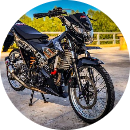tìm ~ 20 từ thuộc ' Unit 7. Traffic '

Những câu hỏi liên quan
Unit 7:Traffic
1. Listen and read.
(Nghe và đọc)
Click tại đây để nghe:
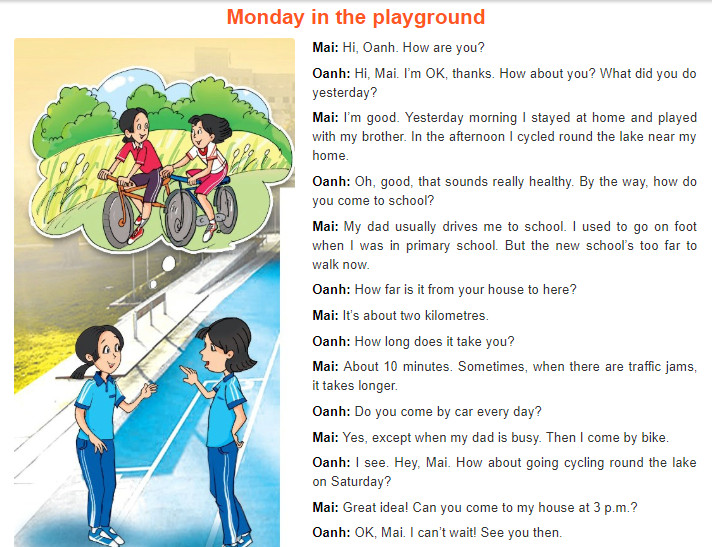
Tạm dịch:
Mai: Chào, Oanh. Bạn khỏe không?
Oanh: Chào Mai. Mình khỏe, cảm ơn. Bạn khỏe không? Hôm qua bạn làm gì?
Mai: Mình khỏe. Sáng hôm qua mình ở nhà và chơi với em trai. Buổi chiều mình đạp xe quanh hồ gần nhà.
Oanh: Ồ, tốt, điều đó dường như thật sự có lợi cho cơ thể. Nhân tiện, bạn đến trường bằng gì?
Mai: Ba mình thường lái xe đưa mình đến trường. Mình từng đi bộ khi mình học tiểu học. Nhưng bây giờ trường mới quá xa nên không thể đi bộ được.
Oanh: Từ nhà bạn đến đây bao xa?
Mai: Khoảng 2km.
Oanh: Bạn đi mất khoảng bao lâu?
Mai: Khoảng 10 phút. Thỉnh thoảng, nếu bị kẹt xe, thì sẽ mất thời gian hơn.
Oanh: Bạn đến trường bằng xe hơi mỗi ngày à?
Mai: Đúng thế, ngoại trừ khi ba mình bận. Khi đó mình đi bằng xe đạp.
Oanh: Mình hiểu rồi Mai à. Thứ Bảy này chúng mình đạp xe quanh hồ chơi nhé?
Mai: Ý kiến hay đấy! Khoảng 3 giờ chiều cậu đến nhà mình nhé?
Oanh: Được thôi, Mai. Mình rất mong! Tạm biệt.
a. Choose the correct answer
(Chọn câu trả lời chính xác)
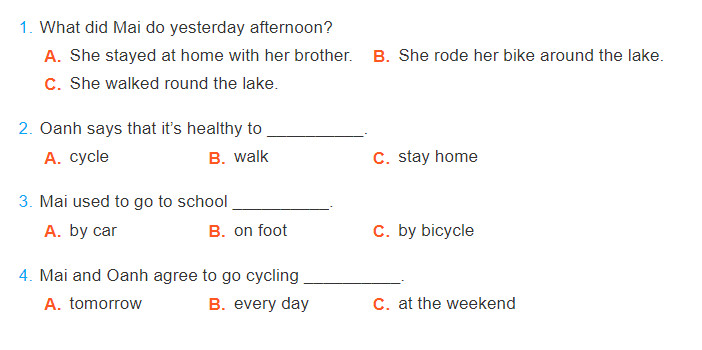 Hướng dẫn giải:
Hướng dẫn giải:
1. B
2. A
3. B
4. C
Tạm dịch:
1. Chiều hôm qua Mai làm gì?
A. Cô ấy ở nhà với em trai.
B. Cô ấy đạp xe đạp quanh hồ.
C. Cô ấy đi bộ quanh hồ.
2. Oanh nói rằng thật có lợi cho sức khỏe khi...
A. đạp xe
B. đi bộ
C. bằng xe đạp
3. Mai từng đến trường bằng cách....
A. bằng xe hơi
B. đi bộ
C. bằng xe đạp
4. Mai và oanh đồng ý đi xe đạp...
A. ngày mai
B. mỗi ngày
C. vào cuối tuần
b. Answer the following questions
(Trả lời những câu hỏi sau.)
Hướng dẫn giải: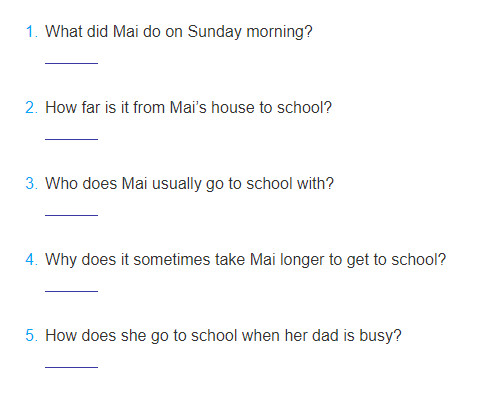
1. She stayed at home and played with her brother.
2. It’s about two kilomiters.
3. She usually goes to school with her dad.
4. Because sometimes there are traffic jams.
5. She goes to school by bike.
Tạm dịch:
1. Mai làm gì vào sáng Chủ nhật?
- Cô ấy ở nhà và chơi với em trai.
2. Từ nhà Mai đến trường bao xa?
- Khoảng 2km.
3. Mai thường đến trường với ai?
- Cô ấy thường đến trường với ba mình
4. Tại sao thỉnh thoảng Mai lại mất nhiều thời gian hơn để đi đến trường?
- Bởi vì thỉnh thoảng có kẹt xe.
5. Khi ba cô ấy bận, cô ấy đến trường bằng gì?
- Cô ấy đi xe đạp đến trường.
3. Can you find the following expressions in the conversation? Do you knowwhat they mean?
(Em có thể tìm được những thành ngữ sau trong bài đàm thoại không? Em có biết chúng có nghĩa gì không?)

Hướng dẫn giải:
1. hey: to get some’s attention
2. great idea: when you strongly support or agree with something
3. can’t wait: very excited and keen to do something
Tạm dịch:
1. Gây sự chú ý với ai
2. Khi bạn hết sức ủng hộ hoặc đồng ý với điều gì
3. Rất hào hứng và thích làm điều gì đó
d. Work in pairs. Make short role-plays with the expressions above. Then practise them
(Làm theo nhóm. Đóng vai với những thành ngữ bên trên. Sau đó thực hành chúng)
Hướng dẫn giải:
- Hey
A: Hey, shall we go to the zoo this Sunday?
B: Great idea!
A: Yeah, I can’t wait!
Tạm dịch:
- Hey
A: Này, Chủ nhật này chúng ta đi đến sở thú nhé?
B: Ý kiến hay đấy!
A: Đúng thế, mình rất mong đợi.
2. MEANS Of TRANSPORT
(Phương tiện vận chuyển)
Write the words using the first Ferrer
(Viết những từ sử dụng chữ cái đầu tiên được cho)
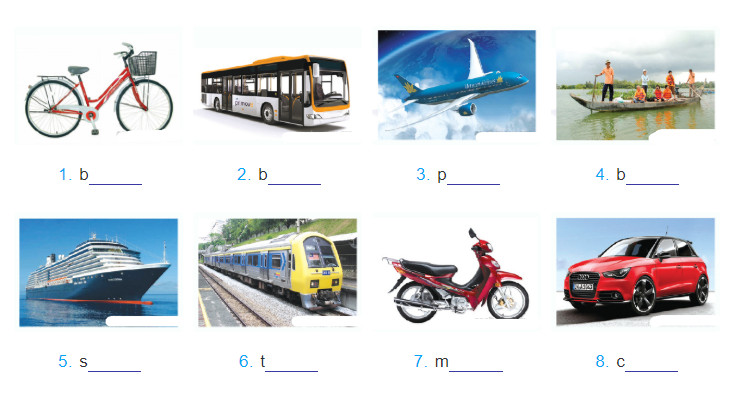
Hướng dẫn giải:
1. bike/bicycle
2. bus
3. ship
4. boat
5. ship
6. train
7. motorbike
8. car
Tạm dịch:
1. xe đạp
2. xe buýt
3. con tàu
4. con thuyền
5. con tàu
6. tàu hỏa
7. xe máy
8. xe hơi
3. Match a verb on the left with a means of transport on the right. There may be more than one correct answer. Add a preposition when necessary.
(Nối một động từ bên trái với một phương tiện giao thông bên phải. Sẽ có hơn một câu trả lời đúng. Thêm giới từ khi cần thiết)
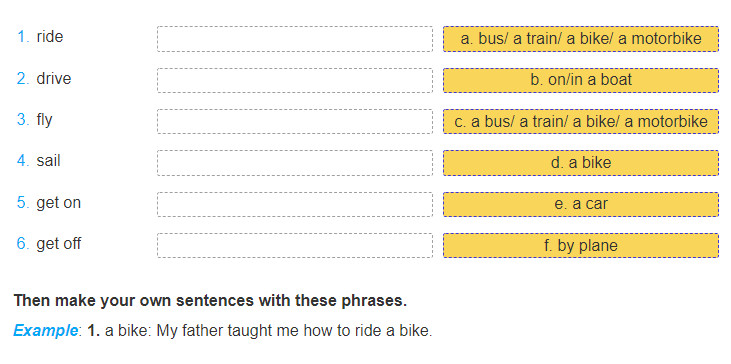
Hướng dẫn giải:
1 - d ride a bike
2 - c, e drive a bus/ a car
3 - f fly by plane
4 - b sail on/in a boat
5 - c, a, d get on a bus/ a train/ a bike
6 - c, a, d get off a bus/ a train/ a bike
1. I usually ride a bike to school.
2. My father drives a car to take me to school.
3. I usually fly to Ha Noi by plane.
4. You can go to Phu Quoc Island by boat.
5. Please get on the bus on time.
6. There is a station ahead; you can get off the train there.
Tạm dịch:
1. Tôi thường đạp xe đến trường.
2. Ba tôi lái xe đưa tôi đến trường.
3. Tôi thường đi Hà Nội bằng máy bay.
4. Bạn có thể đi đến đảo Phú Quốc bằng thuyền.
5. Vui lòng lên xe buýt đúng giờ.
6. Có một ga phía trước; bạn có thể xuống tàu ở đó.
4. Find someone in your class who never
(Tìm ai đó trong lớp mà)
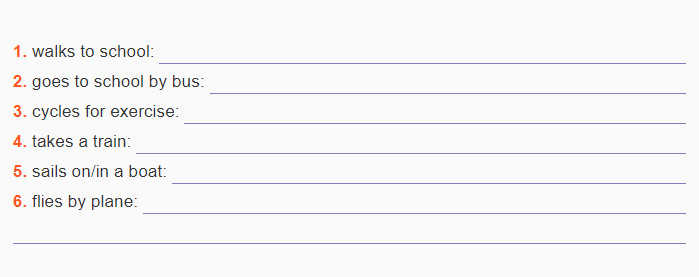
Hướng dẫn giải:
1. walks to school
Nam usually walks to school.
2. goes to school by bus
Mai goes to school by bus.
3. cycles for exercise
Hoa cycles for exercise.
4. takes a train
Minh take a train to go to his hometown.
5. sails on/ in a boat
Mr. Hoa sails the boat very well.
6. flies by plane
Ngoc flies to Da Nang by plane.
Tạm dịch:
1. đi bộ đến trường
Nam thường xuyên đi bộ đến trường.
2. đi xe buýt đến trường
Mai đi xe buýt đến trường. / Mai đến trường bằng xe buýt.
3. đạp xe tập thể dục
Hoa đạp xe để tập thể dục.
4. đi tàu hỏa/ lửa
Minh đi tàu hỏa/ lửa về quê của cậu ấy.
5. lái tàu
Ông Hòa lái tàu rất tốt.
6. đi bằng máy bay
Ngọc đến Đà Nẵng bằng máy bay
Đúng 0
Bình luận (3)
Unit 7:Traffic
Acloser look 2 sách vnen
1. Write sentences with it. Use these cues. (Viết câu sử dụng it. Sử dụng các gợi ý sau.)
1. It's about 700 meters from my house to Youth Club.
2. It is about 5 kilometers from my home village to the nearest town.
3. It's about 120 kilometers from Ho Chi Minh City to Vung Tau.
4. It's about 384,400 kilometers from the Earth to the Moon.
5. It is not very far from Ha Noi to Noi Bai Airport.
2. Work in pairs. Ask and answer questions about distances in your neighbourhood. (Làm việc theo cặp. Hỏi và trả lời câu hỏi về khoảng cách trong vùng của bạn.)
A: How far is it from your house to the open-air market? (Từ nhà bạn đến chợ/siêu thị bao xa?)
B: It's about 1 kilometer. (Khoảng 1 km.)
A: How far is it from your school to the playground? (Từ trường bạn đến sân chơi bao xa?)
B: It's about 100 meters. (Khoảng 100 mét.)
A: How far is it from your house to the river? (Từ nhà bạn đến dòng sông bao xa?)
B: It's about 2 kilometers. (Khoảng 2 km.)
A: How far is it from the bus station to your village? (Từ điểm đón xe buýt đến làng bạn bao xa?)
B: It's about 4 kilometers. (Khoảng 4 km.)
3. Complete the sentences with used to or use to and the verbs in the box below. (Hoàn thành câu với used to hoặc use to và động từ trong bảng dưới đây.))
1. used to ride.
2. used to be.
3. used to go.
4. Did you use to play.
5. did not use to feel.
Hướng dẫn dịch
1. Tôi thường đạp xe đạp 3 bánh khi còn nhỏ.
2. Trên đường từng có ít người và xe cộ.
3. Ba tôi từng đi làm bằng xe máy. Bây giờ ông ấy đi xe đạp.
4. Bạn đã từng chơi trôn tìm khi còn nhỏ không?
5. Cách đây 5 năm người ở thị trấn này chưa từng cảm thấy lo sợ vì kẹt xe.
4. Rewrite the sentences using used to. (Viết lại câu sử dụng used to.)
1. My mum used to live in a small village when she was a girl.
2. There didn't use to be many vehicles on the roads before.
3. We used to cycle to school two years ago.
4. Now there are more traffic accidents than there used to be.
5. My uncle used to be a bus driver some years ago, but now he has a desk job.
5. Work in groups. Did you use to do those things? Ask and answer. (Làm việc theo nhóm. Bạn đã từng làm những việc đó chưa? Hỏi và trả lời.)
1. Did you use to play marbles? (Bạn đã từng chơi trò bắn bi phải không?)
Yes, I did. I used to play with my friends in my hometown. (Phải. Tớ đã từng chơi với bạn bè ở quê.)
2. Did you use to play football in the street? (Bạn đã từng chơi bóng đá trên đường phố phải không?)
No, I didn't. Because it's dangerous. (Không. Bởi vì nó nguy hiểm.)
3. Did you use to swim in the pond near your house? (Bạn đã từng bơi ở trong cái ao gần nhà bạn phải không?)
Yes, I did. I like swimming very much. (Phải. Tớ rất thích bơi.)
4. Did you use to ride a tricycle? (Bạn đã từng đi xe đạp ba bánh phải không?)
No, I didn't. I never had a chance. (Không. Tớ chưa từng có cơ hội.)
5. Did you use to ride a buffalo? (Bạn đã từng cưỡi trâu phải không?)
Yes, I did. When I was a child, I used to ride buffalos. (Phải. Khi tớ còn nhỏ, tớ từng cưỡi trâu.)
Đúng 0
Bình luận (1)
Viết 1 đoạn văn thuyết trình về Traffic - Giao thông
ko chép mạng, tham khảo 1 it thì dc nha
Đúng 0
Bình luận (0)
GRADE 7 UNIT 7: TRAFFIC (GIAO THÔNG)I. Arrange the words to make meaningful sentences. 1. is/ the/ your/ train station/ how/ hotel/ to/ far/ it/ from ?____________________________________________________________________2. my/ it/ not/ is/ far/ very/ house/ from/ to/ school.____________________________________________________________________3. used/ school/ on/ Mai/ foot/ she/ to/ go/ to/ was/ in/ when/ primary school.____________________________...
Đọc tiếp
GRADE 7 UNIT 7: TRAFFIC (GIAO THÔNG)
I. Arrange the words to make meaningful sentences.
1. is/ the/ your/ train station/ how/ hotel/ to/ far/ it/ from ?
____________________________________________________________________
2. my/ it/ not/ is/ far/ very/ house/ from/ to/ school.
____________________________________________________________________
3. used/ school/ on/ Mai/ foot/ she/ to/ go/ to/ was/ in/ when/ primary school.
____________________________________________________________________
4 there/ city center/ traffic jams/ are/ the/ in/ rush hour/ often/ the/ in.
____________________________________________________________________
5. wear/ a/helmet/ compulsory/ is/ when/ in/ it/ to/ riding/ Vietnam/ a/ motorbike.
____________________________________________________________________
II. Choose the best answer a, b, c or d to complete the sentence.
1. You should walk across the street ______ the zebra crossing.
a. on b. at c. in d. from
2. My house is not far from my school, so I usually go ______.
a. on foot b. by foot c. by car d. by boat
3. This morning, I was ______ in a traffic jam and got to school fifteen minutes late.
a. catch b. block c. struck d. got
4. It is ______ to use a hand-held mobile phone while driving or riding.
a. safe b. important c. illegal d. careful
5. ______ does it take you to ride to school? – About 30 minutes.
a. How long b. How far c. How often d. How much
6. You ______ cross the street when the light is red.
a. should b. don’t have to c. can d. mustn’t
7. People ______ produce as much rubbish as we do now.
a. use to b. used to c. used to not d. didn’t use to
8. “How far is Vung Tau from Ho Chi Minh City”-“_______”
A. It’s not very far b. it takes about two hours or more.
c. It’s about 120km d. You can get to Vung Tau by boat or bus.
III. Make sentences using the words given.
1. The roads/ Vietnam/ too/ narrow/ travel/ easily.
_____________________________________________________
2. How far/ it/ your house/ the bookstore?
_____________________________________________________
3. Mai/ used/ go/ school/ foot/ when/ she/ primary school.
_____________________________________________________
4. It/ very important/ obey/ traffic rules/ when/ use/ road.
______________________________________________________
5. It/ ten kilometres/ the town/ the airport.
______________________________________________________
6. Two days ago/ we/ stuck/ traffic jam/ over two hours.
______________________________________________________
7. Most streets/ city centre/ congested/ rush hour
______________________________________________________
8. you/ use/ have/ tricycle/ when/ child?
______________________________________________________
IV. Read the following text carefully and choose the correct answer A, B, C or D for each of the gap.
When you are in Singapore, you can go about (1) taxi, by bus, or by underground. I myself prefer the underground (2) it is fast, easy and cheap. There are (3) buses and taxis in Singapore and one cannot drive along the road (4) and without many stops, especially on Monday morning. The underground is therefore usually quicker (5) taxis or buses. If you do not know Singapore very well, it is difficult (6) the bus you want. You can take a taxi, but it is (7) expensive than the underground or a bus. On the underground, you find good maps that (8) you the names of the stations and show you (9) to get to them, so (10) it is easy to find your way.
1. A. by B. in C. at D. on
2. A. but B. because C. when D. so
3. A. few B. a lot C. many D. some
4. A. quick B. quickly C. quicker D. quickest
5. A. so B. like C. than D. as
6. A. find B. to find C. finding D. found
7. A. less B. more C. most D. much
8. A. tell B. told C. tells D. telling
9. A. who B. what C. when D. how
10. A. how B. that C. when D. where
V. Make questions for the underlined parts:
1. They decorate their house with beautiful Christmas trees
…………………………………………………………………………….?
2. Last year I went to Thailand with my parents
……………………………………………………………………………..?
3. This festival is held in my country every two years
……………………………………………………………………………..?
4. It is 2 kms from my house to school.
………………………………………………………………………………?
5. They celebrate the festival after harvesting the crop.
………………………………………………………………………………..?
VI. Rewrite the sentences without changing the meanings
1.The distance from Qui Nhon to Da Lat is about 500 km
- It……………………………………………………………………………………………
2. Mr Son went to work by car some years, but now he cycles
- Mr Son used………………………………………………………………………………..
3. My father often drives his car to work
- My father often goes………………………………………………………………………
4. People in the countryside will increase the use of biogas for cooking.
- The use of biogas for cooking…………………………………………………………….
5. Road users should obey traffic rules strictly.
- Traffic rules should………………………………………………………………………..
Bn chia thành các đoạn nhỏ để làm cho dễ hơn có dc ko =D?
Đúng 0
Bình luận (0)
I. Arrange the words to make meaningful sentences.
1. is/ the/ your/ train station/ how/ hotel/ to/ far/ it/ from ?
___How far is it from your hotel to train station?_________________________________________________________________
2. my/ it/ not/ is/ far/ very/ house/ from/ to/ school.
____It is not very far from my house to school________________________________________________________________
3. used/ school/ on/ Mai/ foot/ she/ to/ go/ to/ was/ in/ when/ primary school.
_____Mai used to go to school on foot when she was in primary school_______________________________________________________________
4 there/ city center/ traffic jams/ are/ the/ in/ rush hour/ often/ the/ in.
____ there are often traffic jams in the city centre in rush hour________________________________________________________________
5. wear/ a/helmet/ compulsory/ is/ when/ in/ it/ to/ riding/ Vietnam/ a/ motorbike.
________It is compulsory to wear a helmet when riding a motorbike in Vietnam____________________________________________________________
Đúng 0
Bình luận (0)
ai giúp mình viết bài project tiếng anh lớp 7 unit 7 được ko mai mình phải nộp rùi( viết về traffic)
Tìm từ vựng phần a closer look 1 unit 5 tiếng anh 7
Giúp mik nha
Xem chi tiết
Từ vựng Unit 20 lớp 5
| Tiếng Anh | Phiên âm | Tiếng Việt |
| address | /əˈdres/ | địa chỉ |
| lane | /leɪn/ | ngõ |
| road | /rəʊd/ | đường (trong làng) |
| street | /strɪkt/ | đường (trong thành phố) |
| Flat | /flæt/ | căn hộ |
| city | /ˈsɪti/ | thành phố |
| village | /ˈvɪlɪdʒ/ | ngôi làng |
| country | /ˈkʌntri/ | đất nước |
| tower | /ˈtaʊə(r)/ | tòa tháp |
| mountain | /ˈmaʊntɪn/ | ngọn núi |
| district | /ˈdɪstrɪkt/ | huyện, quận |
| province | /ˈprɒvɪns/ | tỉnh |
| hometown | /həʊm taʊn/ | quê hương |
| where | /weə(r)/ | ở đâu |
| from | /frɒm/ | đến từ |
| pupil | /ˈpjuːp(ə)l/ | học sinh |
| live | /lɪv/ | sống |
| busy | /ˈbɪzi/ | bận rộn |
| far | /fɑː(r)/ | xa xôi |
| quiet | /ˈkwaɪət/ | yên tĩnh |
| crowded | /ˈkraʊdɪd/ | đông đúc |
| large | /lɑː(r)dʒ/ | rộng |
| small | /smɔːl/ | nhỏ, hẹp |
| pretty | /ˈprɪti/ | xinh xắn |
| beautiful | /ˈbjuːtəf(ə)l/ | đẹp |
Đúng 0
Bình luận (0)
Write a paragraph about the traffic problem in a village.You may use the following cues .Make sure to use the right connectors.
BẠN NÀO HỌC SÁCH BÀI TẬP TIẾNG ANH LỚP 7 TẬP 2 DẠNG LỚN MÀU CAM
( UNIT 7 / TRAFFIC ) TRANG 9
THÌ GIÚP MÌNH VỚI ! PLEASE

Traffic Problems Essay - Model Answer
Traffic congestion in many cities around the world is severe. One possible solution to this problem is to impose heavy taxes on car drivers and use this money to make public transport better. This essay will discuss the benefits and drawbacks of such a measure.
One of the first benefits of such a measure is that the heavy taxes would discourage car owners from using their cars because it would become very expensive to drive. This would mean that they would begin to make use of public transport instead, thus reducing traffic problems and pollution as well. Another benefit would be that much more use would be made of public transport if it was improved. It is often the case that public transport in cities is very poor. For example, we often see old buses and trains that people would rather not use. High taxes would generate enough money to make the necessary changes.
Nevertheless, there are drawbacks to such a solution. First and foremost, this would be a heavy burden on the car drivers. At present, taxes are already high for a lot of people, and so further taxes would only mean less money at the end of the month for most people who may have no choice but to drive every day. In addition, this type of tax would likely be set at a fixed amount. This would mean that it would hit those with less money harder, whilst the rich could likely afford it. It is therefore not a fair tax.
To conclude, this solution is worth considering to improve the current situation, but there are advantages and disadvantages of introducing such a polic![]() neu kho thi vao google dich ma dich nha
neu kho thi vao google dich ma dich nha
Đúng 0
Bình luận (0)
các bạn rõ là sướng được học sách mới lại còn hiện đại , bọn mink học sách cũ và cổ lắm
Đúng 0
Bình luận (0)
Sách này lạ quá!!!!!!!!!!!!!!!!!!!!!!!!!!!!!!!!!!!!!!!!!!!!!!!!!
Đúng 0
Bình luận (0)
Xem thêm câu trả lời
Từ vựng Unit 7 lớp 5
| Tiếng Anh | Phiên âm | Tiếng Việt |
| skill | /skil/ | kĩ năng |
| peak | /pi:k/ | nói |
| listen | /lisn/ | nghe |
| read | /ri:d/ | đọc |
| write | /rait/ | viết |
| vocabulary | /və'kæbjuləri/ | từ vựng |
| grammar | /græmə/ | ngữ pháp |
| phonetics | /fə'netiks/ | ngữ âm |
| notebook | /noutbuk/ | quyển vở |
| story | /stɔ:ri/ | truyện |
| /imeil/ | thư điện tử | |
| letter | /letə/ | thư (viết tay) |
| newcomer | /nju:kʌmə/ | người mới |
| learn | /lə:nt/ | học |
| song | /sɔη/ | bài hát |
| aloud | /ə'laud/ | to, lớn (về âm thanh) |
| lesson | /lesn/ | bài học |
| foreign | /fɔrin/ | nước ngoài, ngoại quốc |
| language | /læηgwidʒ/ | ngôn ngữ |
| French | /frent∫/ | tiếng Pháp |
| favourite | /feivərit/ | ưa thích |
| understand | /ʌndə'stud/ | hiểu |
| communication | /kə,mju:ni'kei∫n/ | sự giao tiếp |
| necessary | /nesisəri/ | cần thiết |
| free time | /fri: taim/ | thời gian rảnh |
| guess | /ges/ | đoán |
| meaning | /mi:niη/ | ý nghĩa |
| stick | /stick/ | gắn, dán |
| practise | /præktis/ | Thực hành, luyện tập |
Đúng 0
Bình luận (0)





